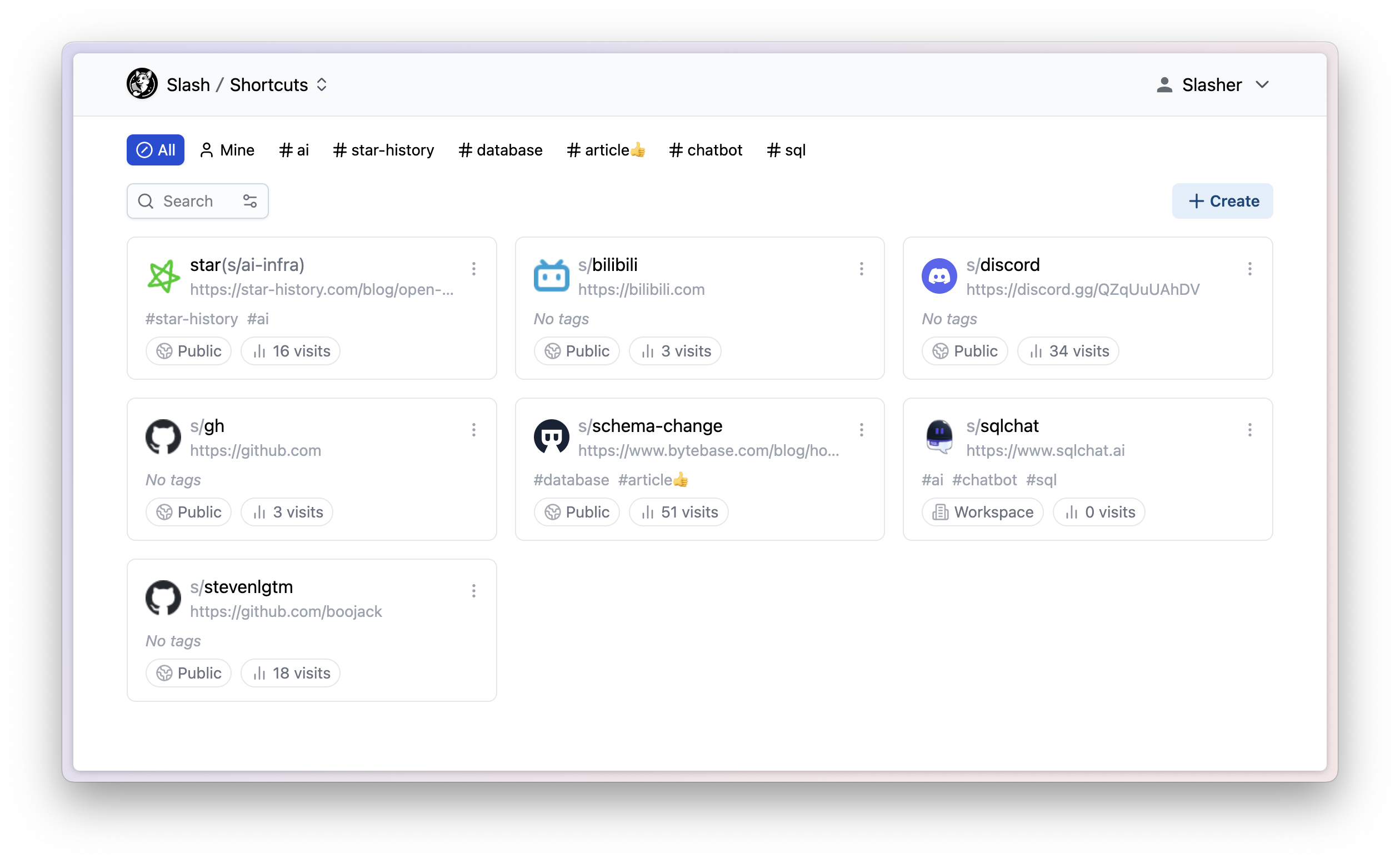Self-Host Open-Source Slash Link Shortener on Docker
Slash, the open-source link shortener. Create custom short links, organize them with tags, share them with your team, and track analytics while maintaining data privacy.

Sharing links is an integral part of our daily online communication. However, dealing with long, complex URLs can be a hassle, making remembering and sharing links efficiently difficult.
What is Slash?

Slash is an open-source, self-hosted link shortener that simplifies the managing and sharing of links. Slash allows you to create customizable, shortened URLs (called "shortcuts") for any website or online resource. With Slash, you can say goodbye to the chaos of managing lengthy links and embrace a more organized and streamlined approach to sharing information online.
One of the great things about Slash is that it can be self-hosted using Docker. By self-hosting Slash, you have complete control over your data.
Features of Slash:
- Custom Shortcuts: Transform any URL into a concise, memorable shortcut for easy sharing and access.
- Tag Organization: Categorize your shortcuts using tags for efficient sorting and retrieval.
- Team Sharing: Collaborate by sharing shortcuts with your team members.
- Link Analytics: Track link traffic and sources to understand usage.
- Browser Extension: Access shortcuts directly from your browser's address bar on Chrome & Firefox.
- Collections: Group related shortcuts into collections for better organization.

Setup Slash Link Shortner with Docker
Follow the simple steps to get Slash up and running on your server or local machine.
Prerequisites:
- Basic knowledge of Docker and Docker Compose
- Docker & Docker Compose installed on your machine
- A domain name or IP address pointing to your server
Method 1: Docker Run CLI
The docker run command is used to create and start a new Docker container. To deploy Slash, run:
docker run -d --name slash -p 5231:5231 -v ~/.slash/:/var/opt/slash yourselfhosted/slash:latest
Let's break down what this command does:
docker runtells Docker to create and start a new container-druns the container in detached mode (in the background)--name slashgives the container the name "slash" for easy reference-p 5231:5231maps the container's port 5231 to the host's port 5231, allowing access to Slash from your browser-v ~/.slash/:/var/opt/slashcreates a volume to store Slash's persistent data on your host machineyourselfhosted/slash:latestspecifies the Docker image to use (the latest version of Slash)
After running this command, your Slash instance will be accessible at http://your-server-ip:5231.
Method 2: Docker Compose
Docker Compose is a tool that simplifies defining and running multi-container Docker applications. It uses a YAML file to configure the application's services.
- Create a new file named
docker-compose.ymland paste the contents of the Docker Compose file provided below.
version: '3'
services:
slash:
image: yourselfhosted/slash:latest
container_name: slash
ports:
- 5231:5231
volumes:
- slash:/var/opt/slash
restart: unless-stopped
volumes:
slash:docker-compose.yml
- Start Slash using the Docker Compose command:
docker compose up -d
This command will pull the required Docker images and start the Slash container in the background.
- After running this command, your Slash container will be accessible at
http://your-server-ip:5231
Slash is ready & allows you to create, manage, and share shortened URLs without relying on third-party services or compromising your data privacy.

Benefits of Self-Hosting Slash Link Shortener
By self-hosting you gain several advantages:
- Data Privacy: Keep your data and links secure within your infrastructure, ensuring complete control over your information.
- Customization: Tailor Slash to your specific needs, such as branding, integrations, or additional features.
- Cost-Effective: Eliminate recurring subscription fees associated with third-party link-shortening services.
- Scalability: Scale your Slash instance according to your requirements, ensuring optimal performance as your link management needs to grow.
Slash offers a seamless solution for managing and sharing links, empowering individuals and teams to streamline their digital workflows.

Other Open-Source Link Shorteners











